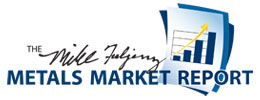
February 2015, Week 4 Edition
In the first two months of 2015, gold is up slightly, but the real story (so far) is a tale of two months, with gold rising $100 from the January 2 close to the February 2 close, then falling $60 by March 2. (Since January 1, February 1 and March 1 were either holidays or Sundays, the 2nd day of the month is the first trading day of each month.) Through Monday, March 2, silver is up 5.86% and gold is up 3.46%. By contrast, crude oil is down 4.36% so far in 2015, and platinum is down 0.67%, so silver and gold are the stars of an otherwise-anemic commodities market (dampened by the effect of a strong U.S. dollar.)
| Commodity |
Jan. 2 |
Feb. 2 |
Mar. 2 |
Two-month Change |
| Gold |
$1172 |
$1272.50 |
$1212.50 |
+3.46% |
| Silver |
$15.71 |
$17.22 |
$16.63 |
+5.86% |
| Platinum |
$1193 |
$1239 |
$1185 |
-0.67% |
| Crude oil |
$52.72 |
$49.25 |
$50.42 |
-4.36% |
Basis: London pm price fix for the metals; West Texas Intermediate Crude for oil
European Gold Coin Sales Surge on Currency Fears
With the Greek crisis reviving new rumors of a breakup in the Euro-zone, we’re seeing European gold coin demand soar. Reuters reported last week that “German coin dealer Degussa reported a 35% year-on-year increase in its gold coin sales in Germany in January,” while the Austrian Mint “said its sales of Vienna Philharmonic gold coins rose 6% year on year in January.” Last week, GFMS analyst Andrew Leyland said that the threat of the Greek exit (“Grexit”), along with Europe’s negative interest rates and new quantitative easing (QE, or money printing) program has motivated European savers to buy physical gold.
Even though gold is flat in U.S. dollar terms so far in 2015, it’s up 6.4% in euro terms since the start of 2015. The crisis in Ukraine has pushed gold up 72% there, while gold in some other nations is up about 5% to 8%. With the dollar strong in terms of most of other currencies, gold is stronger outside the U.S.
Gold’s Increase in 2015 (outside the U.S.)
| Ukraine |
+72.0% |
| Brazil |
+7.9% |
| Sweden |
+7.9% |
| Canada |
+7.5% |
| Euro-zone |
+6.4% |
| Australia |
+4.9% |
Source: Wall Street Journal, Currencies & Commodities data, Friday, February 20, 2015
Central Banks Bought 477 Tons of Gold in 2014 – Second Best Year Ever
The world’s central banks bought 477.2 metric tons* (15,342,000 Troy ounces) of gold in 2015 – 17% more than they bought in 2013 and the second-highest annual total in the last 50 years. The World Gold Council (WGC) said that central banks spent about $19.4 billion on new gold purchases last year. The WGC report also said that in the last five years, central banks bought 1964 metric tons of gold (393 tons per year). For 2015, WGC expects central banks to buy another 400 tons of gold.
The central bank of Russia was the biggest buyer, accumulating 173 metric tons – over one-third of all central bank purchases. The Russian ruble was one of the weakest currencies in the world in 2014. (After Russia, the next biggest central bank gold buying in 2014 came from Kazakhstan and Iraq, each of which bought about 48 metric tons.) Gold now represents about 12% of Russia’s total foreign reserves. Russia is now one of the top five gold-holding nations, behind only the U.S., Germany, Italy and France.
*A metric ton (or tonne) is one million grams, or 32,150 Troy ounces, or 2,205 pounds
Some Gold-Friendly Hedge Fund Managers Still Like Gold
In the middle of each quarter, hedge fund managers must file forms with the SEC on their holdings at the end of the previous quarter. From the filings released last month, we learn that John Paulson, the largest shareholder of the SPDR Gold Trust (GLD), held on to all his 10.23 million shares of GLD (worth over $1.16 billion) in late 2014. Paulson has held shares representing more than a million ounces of gold for six straight quarters, despite the gradual price decline in gold (in U.S. dollars) over the last two years.
We won’t know hedge fund holdings this quarter until May, but inflows into the GLD ETF in the first six weeks of 2015 are up 59.24 metric tons, well above the 6.63 ton gain in the first six-week period in 2014.
Over in Britain, Sebastian Lyon, manager of the £2.5 billion ($3.9 billion) Troy Trojan fund, may be the “John Paulson of Britain.” His fund holds £200 million ($309 million) worth of gold as part of a well-balanced portfolio (including 8% in gold bullion and 3% in gold ETFs for a total of 11% in gold assets). Gold has helped his portfolio grow during stock market declines: The Troy Trojan fund has returned 108% over the past decade, vs. 81% for the average fund in Britain’s “Flexible Investment” fund sector.
Important Disclosure Notification: All statements, opinions, pricing, and ideas herein are believed to be reliable, truthful and accurate to the best of the Publisher's knowledge at this time. They are not guaranteed in any way by anybody and are subject to change over time. The Publisher disclaims and is not liable for any claims or losses which may be incurred by third parties while relying on information published herein. Individuals should not look at this publication as giving finance or investment advice or information for their individual suitability. All readers are advised to independently verify all representations made herein or by its representatives for your individual suitability before making your investment or collecting decisions. Arbitration: This company strives to handle customer complaint issues directly with customer in an expeditious manner. In the event an amicable resolution cannot be reached, you agree to accept binding arbitration. Any dispute, controversy, claim or disagreement arising out of or relating to transactions between you and this company shall be resolved by binding arbitration pursuant to the Federal Arbitration Act and conducted in Beaumont, Jefferson County, Texas. It is understood that the parties waive any right to a jury trial. Judgment upon the award rendered by the Arbitrator may be entered in any court having jurisdiction thereof. Reproduction or quotation of this newsletter is prohibited without written permission of the Publisher.




